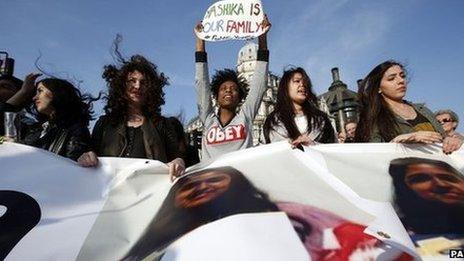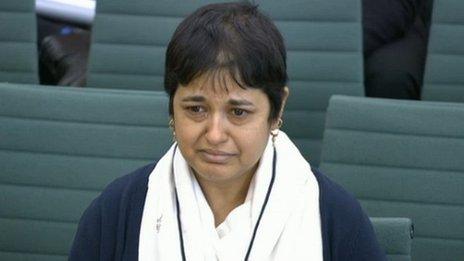Analysis: Yashika Bageerathi and the law
- Published
- comments

Demonstrators in London's Parliament Square highlighted the case
Why was Yashika Bageerathi sent back to Mauritius? The Home Office says the case didn't pass the asylum test.
The law is quite clear that an asylum application must be based on the internationally-agreed criteria of the 1951 Refugee Convention.
That means an applicant needs to show that they need protection from persecution on one of the following grounds:
Political opinion
Race, religion or nationality
Membership of a particular social group that puts them at risk because of the particular situation in the country they are fleeing
This is where the problems started for Yashika Bageerathi. Her - and her family's - application to stay in the UK related to the fact that they were fleeing an abusive relative. On face value, that doesn't appear to be covered by that core of refugee law. It was not designed to end all of human misery, wherever it may be found.
But that's not the whole story - the law is much more nuanced.
It has developed down the years as judges have dealt with specific and complex cases which have forced them to look long and hard at what we mean by asylum and humanitarian protection.
'Social group' test
So while each case has to fit into what appear to be basic constraints of asylum law - it all depends on how you interpret those constraints and the UK's international obligations to care for genuine refugees.
Let's go back to those core tests. One of them is membership of a particular "social group".
The courts have said quite clearly that in certain specific scenarios women can constitute a social group that needs protection under refugee law.
In 1999, the Law Lords issued a landmark judgement in favour of two women from Pakistan, called Shah and Islam.
The women had escaped from terribly violent husbands and argued that if they returned to their home country, they would be accused and convicted in a local sharia court of adultery. They could face either public lashing or stoning. Critically, that court's judgement would give more weight to the claims of their husbands simply because they were men.
The asylum claims were rejected - but the Law Lords said that was wrong.
They ruled that the Pakistani women were part of a social group , externalthat was persecuted because they had no means to defend themselves.
In other words, in that specific context, domestic violence and abuse against women warranted refugee protection because the state exposed the women to persecution.
There have been many developments down the years to further expand on this concept - but none of them have ever said that anybody can just come to the UK and get protection because they have a horrible relative.
There has to be some kind of connection between the abuse and how their home country functions - or rather how it doesn't.
Greyer legal area
Now, some cases are in an even greyer area between the letter of the law and the grim realities of a personal situation. This is where a wider and more subjective test comes into play.
The UK is a signatory to the European Convention on Human Rights, the legal agreement between nations which have declared that they will ensure certain minimum standards of treatment towards people living within their borders.
Those minimum standards also include broadly agreeing not to despatch people to horrible fates overseas.
If a woman fleeing domestic abuse cannot find a way to fit into the refugee criteria, this has sometimes proved to be an avenue open to them.
And in practice, lawyers who work in this field have found courts to be sympathetic if the applicant can convince a judge that they face a really awful fate.
Ministerial discretion
In Yashika Bageerathi's case, judges were not convinced.
There was one final issue in this case: why was the Home Office removing her from the country ahead of her exams?
The Home Office's guidance states that children who are in school and coming to exams should not face removal at that point - even if they may be sent to their home country in the future. Yashika Bageerathi is not a child - she is 19 years old - so the guidance doesn't apply.
And that's why the teenager's supporters put pressure on ministers. They had the discretion to intervene and stop an immigration removal. It was ultimately their decision.
- Published2 April 2014

- Published1 April 2014
